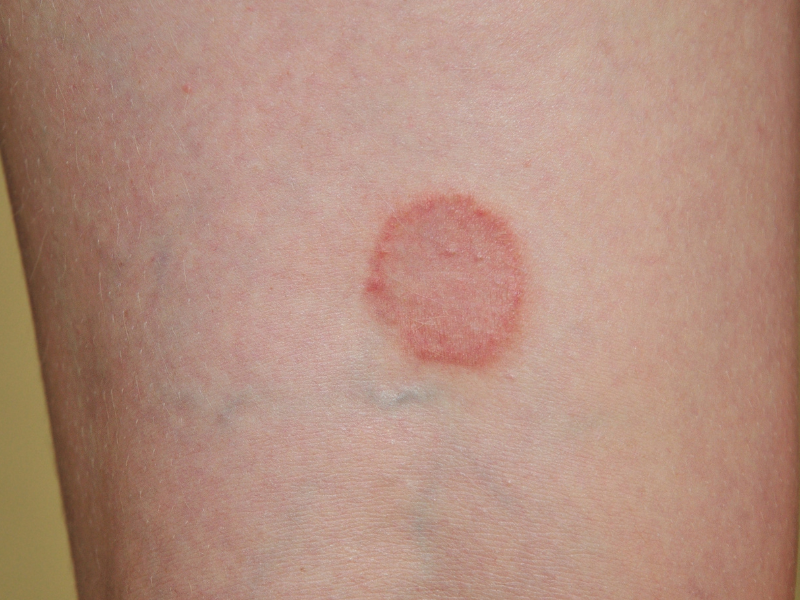Ringworm

Ringworm is a common and contagious fungal infection that affects the skin, hair, and nails. Despite its name, it has nothing to do with worms. The infection gets its name from the characteristic red, itchy, ring-shaped rash that it causes. It affects people of all ages, but it is more common in children.
Ringworm is caused by fungi called dermatophytes. These fungi thrive in warm, moist environments and can infect humans and animals alike.
Types of Ringworm
Ringworm can affect different parts of the body, and depending on the location, it is given different names. The most common types of ringworm are:
1. Tinea corporis: Often referred to as “ringworm of the body,” this condition affects the skin of the face, torso, arms, and legs.
2. Tinea pedis: Also known as athlete’s foot. This fungal infection causes a burning, itchy, skin rash on the soles of your feet and between your toes.
3. Tinea cruris: Also known as jock itch. It affects the skin in the groin area. Jock itch causes itchy, red rash in your thighs, upper groin, or rectum. Some people may even get blisters.
4. Tinea capitis: Also known as ringworm of the scalp, it affects the scalp and hair. Scalp ringworm causes red, scaly, and itchy bald spots on the scalp. The bald spot may grow bigger and become permanent.
5. Tinea unguium: Also known as nail ringworm, it affects the nails. The nails become discolored, thick, and deformed.
Causes of Ringworm
Ringworm is caused by the fungus, dermatophytes. This fungus naturally lives on the skin, hair, and nails. However, when the environment becomes hot and damp, the fungi start growing uncontrollably.
The fungi that cause ringworm thrive in damp, warm areas such as locker rooms, public showers, and swimming pools.
Ringworm can spread through close contact with an infected person or animal or by touching contaminated objects such as towels, clothes, and surfaces.
Symptoms of Ringworm
The symptoms of ringworm depend on the location of the infection. However, common symptoms include:
- A discolored, flat patch of skin that might look brown on darker skin tones and red on lighter complexions.
- A ring-like or circular shape with a raised, scaly border.
- Itching, stinging, or burning sensation on the affected area.
- Blisters or pus-filled bumps on the skin.
- Hair loss or brittle, broken hair.
- Nail discoloration, thickening, or crumbling.
Who gets ringworm?
Ringworm affects people of all ages. However, certain factors increase the risk of getting the infection. These factors include:
- Living in a warm, humid climate.
- Having close contact with an infected person or animal.
- Sharing personal items such as clothes, towels, and bedding.
- Walking barefoot in public areas such as public showers, locker rooms, and swimming pools.
- Having a weakened immune system due to illness or medication.
How contagious is ringworm?
Ringworm is highly contagious. It can spread easily through close contact with an infected person or animal or by touching contaminated objects. The infection can also spread from one part of the body to another.
Ringworm Treatment
You can treat ringworm with antifungal medications available over the counter or by prescription. These medications come in different forms:
· Creams
· Gels
· Powders
If the infection is widespread, your healthcare provider may prescribe oral antifungal medication.
OTC products include:
· Clotrimazole
· Miconazole
· Terbinafine
If your symptoms get worse or don’t clear after two weeks, you may need an oral prescription medication.
Ringworm Prevention
Preventing ringworm involves keeping the skin clean and dry, avoiding close contact with infected persons or animals, and not sharing personal items. It is also essential to disinfect surfaces and objects that come into contact with the infected area. Wearing flip-flops in public areas such as locker rooms, public showers, and swimming pools can also help prevent infection.
Ringworm is a common fungal infection that can affect the skin, hair, or nails. While it is highly contagious and can cause discomfort, prompt diagnosis and treatment can effectively manage the infection and prevent complications.
By practicing good hygiene and taking preventive measures, you can reduce the risk of contracting ringworm and enjoy healthy, radiant skin.



